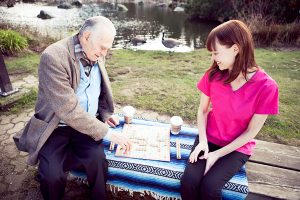Activities for People Living with Dementia
Activities for People Living with Dementia
“I often hear people say that a person suffering from Alzheimer’s is not the person they knew. I wonder to myself – who were they then? Bob DeMarco (Founder of the Alzheimers Reading Room and son of Alzheimers parent)
Currently, it’s estimated that there are half a million Australians living with Dementia, and almost 1.6 million people who are involved in their care.
Whilst it’s true that dementia is one of the most challenging and misunderstood conditions, this does not mean that your loved one is destined for despair.
It’s common for someone with a diagnosis of dementia to gradually withdraw from social activities, which can be distressing for the entire family when they see their loved one no longer pursuing the things they used to enjoy.
No matter the state of their ailments or abilities, everyone shares the need for a good quality of life. Whether your loved one is in early or progressed stages of dementia, it’s still important for them to keep engaging in activities and hobbies that bring them joy and meaning.
Keeping people with dementia involved in their everyday activities and cognitive tasks is beneficial for both their body and mind, and in some cases, can even slow the progression of the condition.
While they might not be able to operate on the same level as prior to their diagnosis, this does not mean they need to give up their interests. The key is to modify activities so that they are safe, suitable and most importantly FUN for your loved one.
Things to consider in finding the right activity for your loved one:


Ideally, the ‘right’ activity for a person living with dementia should build on residual skills, compensate for lost activities, and be a source of fun and empowerment.
Here’s what you should think about when deciding on a fun activity for your loved one.
1. The unique things that make your loved one who they are
What was their former lifestyle like? What was their occupation? What were their interests? Where was their favourite to travel? What is their cultural background?
These are all things to consider in planning an activity, so that you can re-establish old roles and tap into memories of who they are.


2. Their current abilities
It’s important to strike a balance between tasks that are too hard and too easy. If an activity is too simplistic, your loved one might feel insulted or bored. If it’s too hard, they might feel frustrated and dejected.
3. The time and place of the proposed activity
Be selective in when and where your activities take place, in order to best suit your loved one’s level of functioning. For example, if they tend to be more active in the morning, then don’t plan an activity for the afternoon. Make sure there’s good lighting, accessibility, safe working areas and correct work heights in order to ensure a safe activity.


4. Things to avoid
- Overstimulation; e.g. large crowds, loud noises, too much movement, anything that could be overwhelming.
- Pressure; try not to enforce activities that trigger feelings of inadequacy and undue stress. It’s about enjoyment, not outcomes.
- Pointing out what they can no longer do: That will cause your loved one to further withdraw from their passions. Instead, focus on what is still possible.
- Giving up! Mistakes and bad days happen, so it’s important that your loved one doesn’t feel like a failure.
Thirty fun and helpful activities to try with your loved one:
-
- Take a walk together.
- Try water exercise: The buoyancy of water makes water aerobics a great low-impact exercise for dementia, whilst simultaneously encouraging muscle gains.
- Restorative yoga for improving balance and flexibility
- Create a memory bag: Fill a bag with sentimental items from their childhood/young adulthood. Scented products are perfect for this as the sense of smell is strongly associated with memory.
- Do a jigsaw puzzle – cognitive games like puzzles help keep the brain healthy and can even slow down cognitive decline. Puzzles also encourage a release of dopamine and a sense of accomplishment.
- Colour by numbers or memory card games
- Dancing to music from their generation
- Knitting or painting – both can be very relaxing, and provides meaning and a sense of pleasure

- Engage the senses with hand and arm massages. Scented lotion helps too!
- Spend time with pets. Your favourite furry friend can do wonders in bringing your loved one out of their shell.
- Have a sing-along! Singing with others helps to establish social connection with others, as well as trigger memories. People with dementia will often have near-perfect recall of songs and hymns even when other parts of their memory are no longer functioning.
- Set up a fish tank – this has been shown to reduce depression amongst people with dementia.
- Make a scrapbook together so you can connect and reminisce about your favourite memories.
- Play Bingo – a fun activity for everyone and easily adapted for those living with dementia. It can help stimulate thought process and memory.
- Clean up around the home together – involving your loved one’s in the clean-up process can help increase their sense of purpose.
- Prepare a dish together – cook something that your loved one will recognise, pick their favourite meal or dessert.
- Visit a museum – find exhibitions and objects that your loved one can relate to or that reminds them of their past

- Go for a drive around where they used to live, the school they went to.
- Find sensory bean bags with different textures, eg cotton, velvet, silk, filled with different grains to engage the senses.
- Do a crossword puzzle together – this is a great activity for those with early-mid stage dementia. It helps to reduce stress and keep the problem-solving part of the brain active.
- Computer games – there’s now an array of dementia friendly games and youtube videos that are available on your laptop or tablet.
- Tell your favourite joke – having a laugh with your loved one can really lighten the load and turn their frown upside down.
- Brush your loved one’s hair.
- Watch family videos together.
- Visit your local botanical garden.

- Untie knots – a simple activity that encourages the maintenance of dexterity abilities.
- Play catch or toss a ball.
- Model with play-dough
- Draw a family tree
- Have a spelling bee
Learn more about how Nurse Next Door can help with Alzheimer’s and Dementia Care
or contact us today on 1300 600 247 to discuss how Nurse Next Door can help you keep doing what you love.



